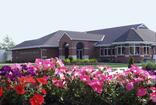The History of Princeton
Thomas Horner, Town Founder
Thomas Horner and Thomas Watson, Jr., British Empire Loyalists from New Jersey were the first white settlers to clear land between the Mohawk Village (Brantford) and Chatham in 1795.
Watson's father, Thomas Sr. (he was also Horner's uncle) was offered a land grant from John Graves Simcoe in 1792 for assistance that Watson, a Loyalist, gave Simcoe, a British military official, during the American Revolutionary War.
The two young men came to the area in 1793 to decide which portions of land could sustain a grist and a saw mill, two very important elements for a successful settlement.
They returned to the United States to purchase the materials for the mills.
Hornor and Watson arranged transportation of these items and in 1795 they began construction.
Watson named the new village Prince Town, after his home town in New Jersey.
Simcoe was replaced as Lieutenant Governor and the new crown official denied Hornor and Watson their generous land grant.
Watson returned to the United States. Hornor stayed and oversaw the gradual growth of his settlement. Early settlers include: Horner, Martin, Burns, Smiley and Galbraith.
Though his mills burned down and he did not replace them, he accomplished many other milestones in the area, including surveying and cutting out roads.
He was Registrar for land transactions, the head of the local militia mustering troops for the War of 1812 and a justice of the peace able to perform marriages in the isolated settlement.
He was twice elected as the representative for Oxford County in the newly formed Legislative Assembly.
Horner was born March 17, 1767 at Mansfield Township, Burlington County, near Bordentown, New Jersey.
Horner emigrated to Canada and he worked hard to develop and serve the settlement which grew into the town of Princeton.
He died in Burford, Brant County, Ontario, of cholera while still serving in legislative office.
Thomas Horner is buried in the Princeton Cemetery and there an historic plaque marks the importance of this courageous, ambitious, community-minded first settler.
The river that runs near the cemetery is named after him, Horner Creek.
Henry Grover's Story About Early 1880s
An attractive, unknown, young man named Richardson showed up at the Strode Hotel one day and seemed ready to settle down in Princeton.
He purchased a horse and buggy and formed many friendships. Two such people, the druggist, Alfred A. Gissing and Jim Smiley took him out to do some shooting and were amazed at his skill.
Mr. Richardson courted and became engaged to local lovely, Miss Rutherford, and they planned to take up farming.
The affianceed fellow chose a farm on the Highway and made a payment on it.
With early spring wedding plans in place, Richardson unaccountably vanished from the area leaving no address.
No locals ever knew much about him or his family connections. Some years later when Jesse James was shot, his picture was in every newspaper.
The long-lost Richardson and the outlaw Jesse James looked so alike that those who know Richardson were sure their amiable friend, and crack rifle shooter, was Jesse James.
First...
...saw mill in Blenheim Township- Built by Thomas Horner 1797.
...white child born in Blenheim Township- Margaret Galbraith, 1801.
...male white child born in Blenheim Township- Thomas J. Horner, 1802.
....grist mill in Blenheim Township- Built by Thomas Horner 1802.
...and only member of parliament to reside in Princeton- Thomas Horner.
...hotel in Princeton- owned by Louis Charles, before 1830.
...cheese factory in Oxford County- Built by T.H. Arnold, 1842.
....railway through Princeton- Great Western Railway, 1853.
...brick house in Blenheim- Built by Samuel Crosby before 1860.
...car in Princeton- A McLaughlin owned by Fred Daniels, 1907.
...bank- the Bank of Hamilton, 1906.
...electric washing machine bought by Ernest Wells, 1914.
...plane in Princeton, owned by Frank Kipp in the 1930s; he took lessons from ace flyer
Mr. Williams of Sweaburg; Frank named his plane the Eagle Rock.
...television set was made by Willard Tottle, Drumbo, 1948.
Notable
Thomas "Carbide" Wilson, inventor of the Carbide lamp, was born in Princeton, 1860.
Walter Gretzky, Wayne Gretzky's father, grew up on his parent's farm in Canning, about 5 miles North East of Princeton.

